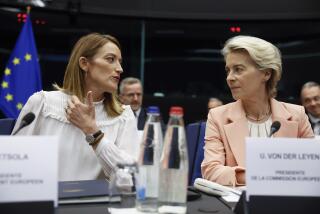EU Works to Avert Clash Over New Bank Head
- Share via
BRUSSELS — European Union ministers voiced guarded optimism Friday that a deal on naming the first head of the European Central Bank would be reached at a weekend summit, averting a clash at the birth of a single European currency.
EU sources said the most likely outcome was that the leaders today would appoint Dutchman Wim Duisenberg, president of the European Monetary Institute, the ECB’s forerunner, for a full eight-year term and leave it to him to indicate his willingness to retire before the end of the term.
France has nominated its central bank governor, Jean-Claude Trichet, for the post and a French minister suggested Friday that Trichet could take over from Duisenberg in 2002, when the new euro coins and bank notes come into general circulation.
Opening the summit, finance ministers formally recommended that 11 countries--Germany, France, Italy, Spain, Portugal, Austria, Belgium, the Netherlands, Luxembourg, Finland and Ireland--launch economic and monetary union on Jan. 1, 1999.
Together they will form the world’s second-largest economy after the United States. Britain, Sweden and Denmark have elected to stay out at the start, while Greece plans to join EMU by 2001.
But European Commission and German officials warned that failure this weekend to select a credible head of the new central bank, which will run monetary policy after the euro’s launch, would undermine financial market confidence in the new currency.
As EU leaders made last-minute efforts to settle the Franco-Dutch row, Dutch Finance Minister Gerrit Zalm told reporters he was “somewhat more optimistic” that there would be agreement today.
The quarrel has strained ties between France and Germany, the two nations that form the backbone of European economic and monetary union agreed to in the 1991 Maastricht Treaty.
British Prime Minister Tony Blair, who will chair the summit, flew to the Netherlands on Friday to meet Prime Minister Wim Kok, who is firmly backing Duisenberg for a full eight-year term, with the support of most EU states.
Speaking after meeting Kok in Rotterdam, Blair made clear that negotiations were continuing. A spokesman for Blair ruled out a third candidate and said Britain believed an agreement could be brokered today.
A deal appeared to hinge on unpredictable French President Jacques Chirac, who stunned the EU last November by nominating Trichet after Duisenberg had already been recommended by all 15 EU central bank chiefs.
Bonn government sources said German Chancellor Helmut Kohl was also involved in trying to find a solution and had telephoned several other EU leaders. Kok, facing a general election next week, told Dutch television he would rather EU leaders delayed the decision than choose the wrong candidate.
Theoretically, the bank chief does not have to be appointed before July 1, but officials said a failure to agree this weekend would turn what should be a proud celebration of European integration into an ill-tempered crisis.
The finance ministers this weekend are also supposed to set the exchange rates at which their currencies will be irrevocably fixed to the euro from Jan. 1.
More to Read
Sign up for Essential California
The most important California stories and recommendations in your inbox every morning.
You may occasionally receive promotional content from the Los Angeles Times.










